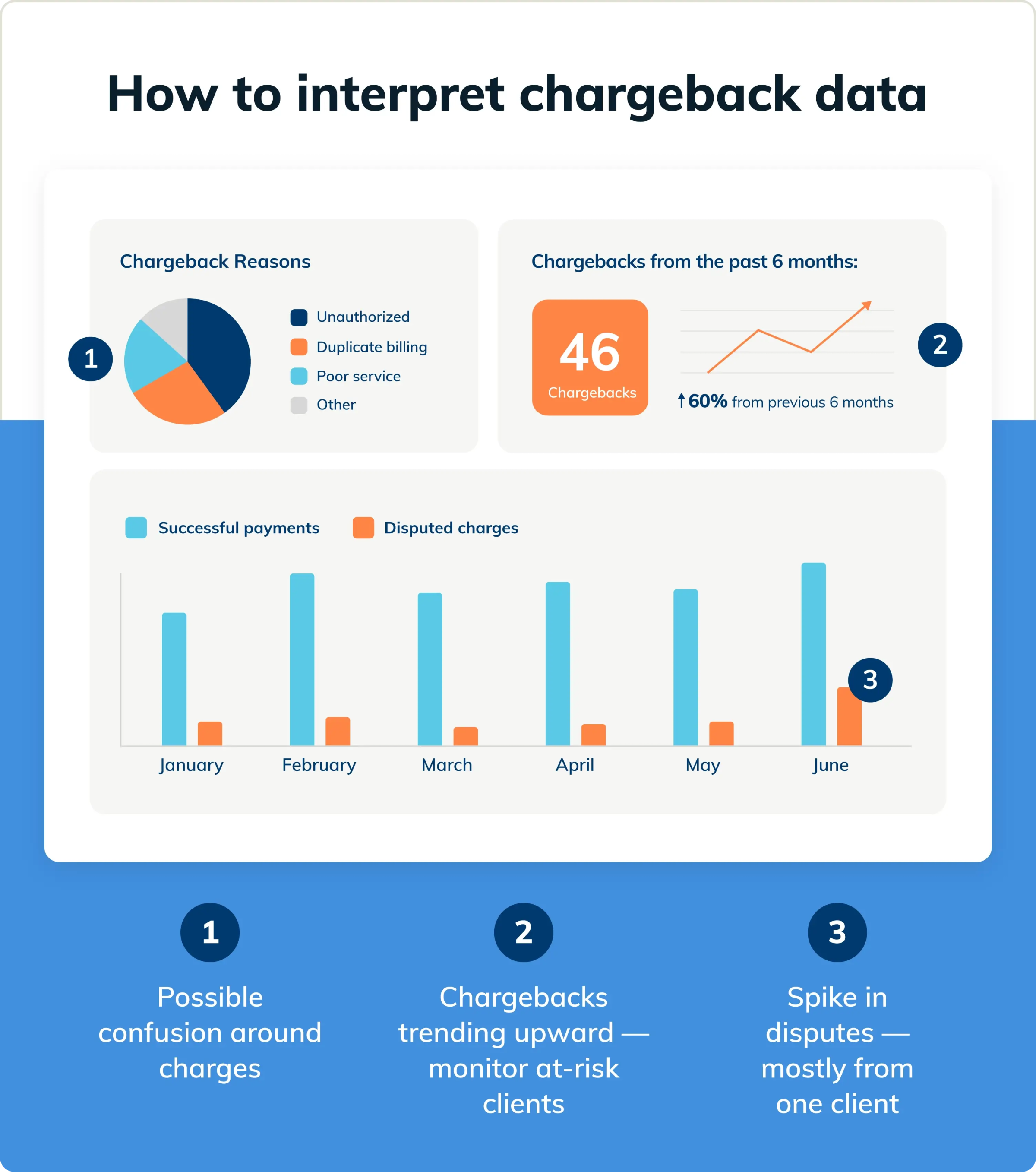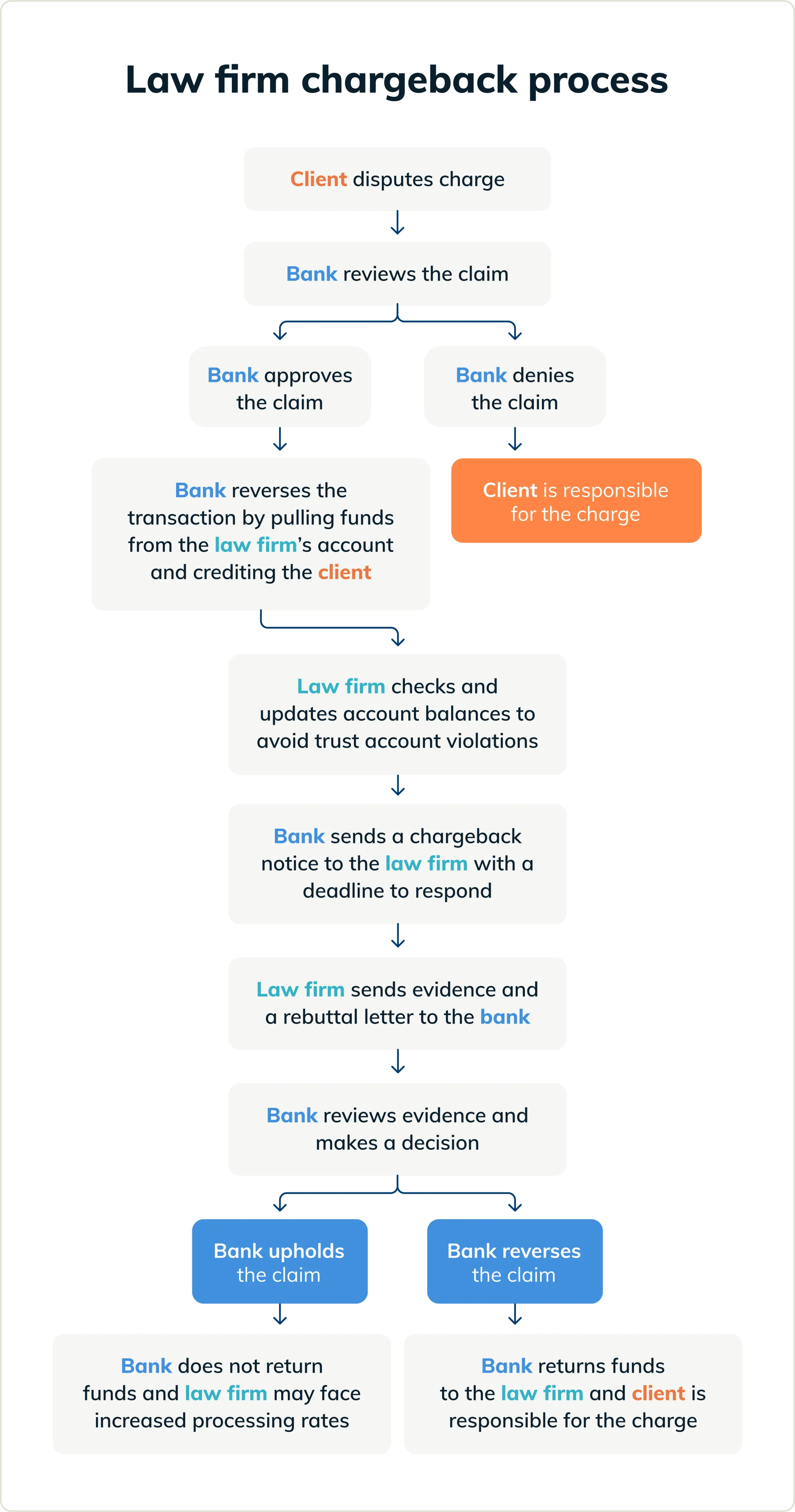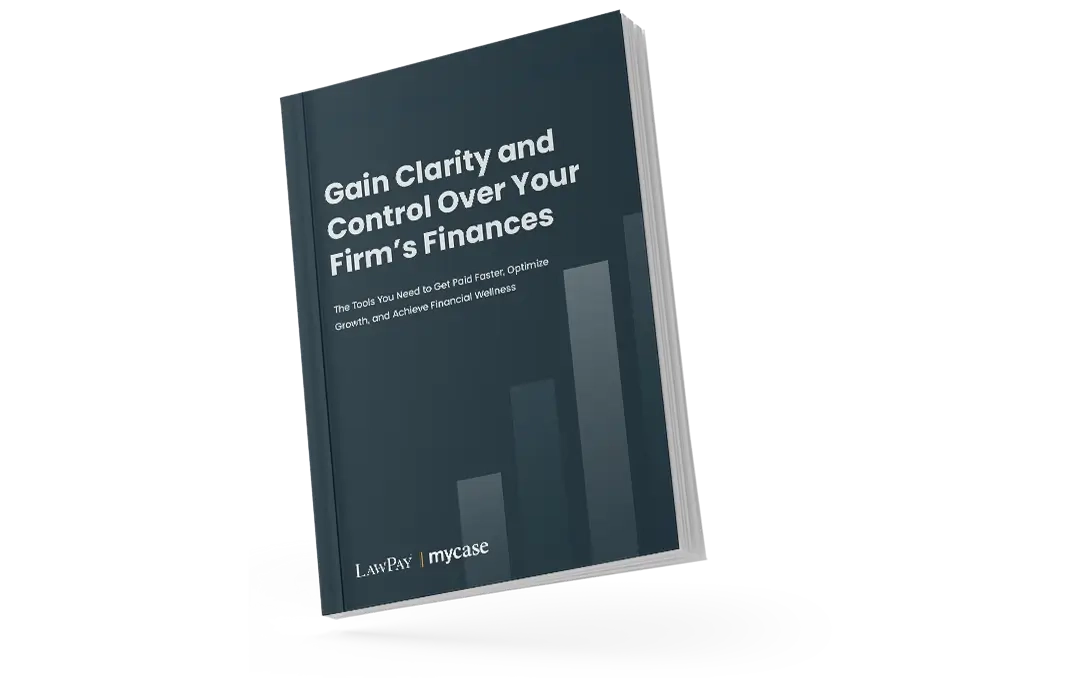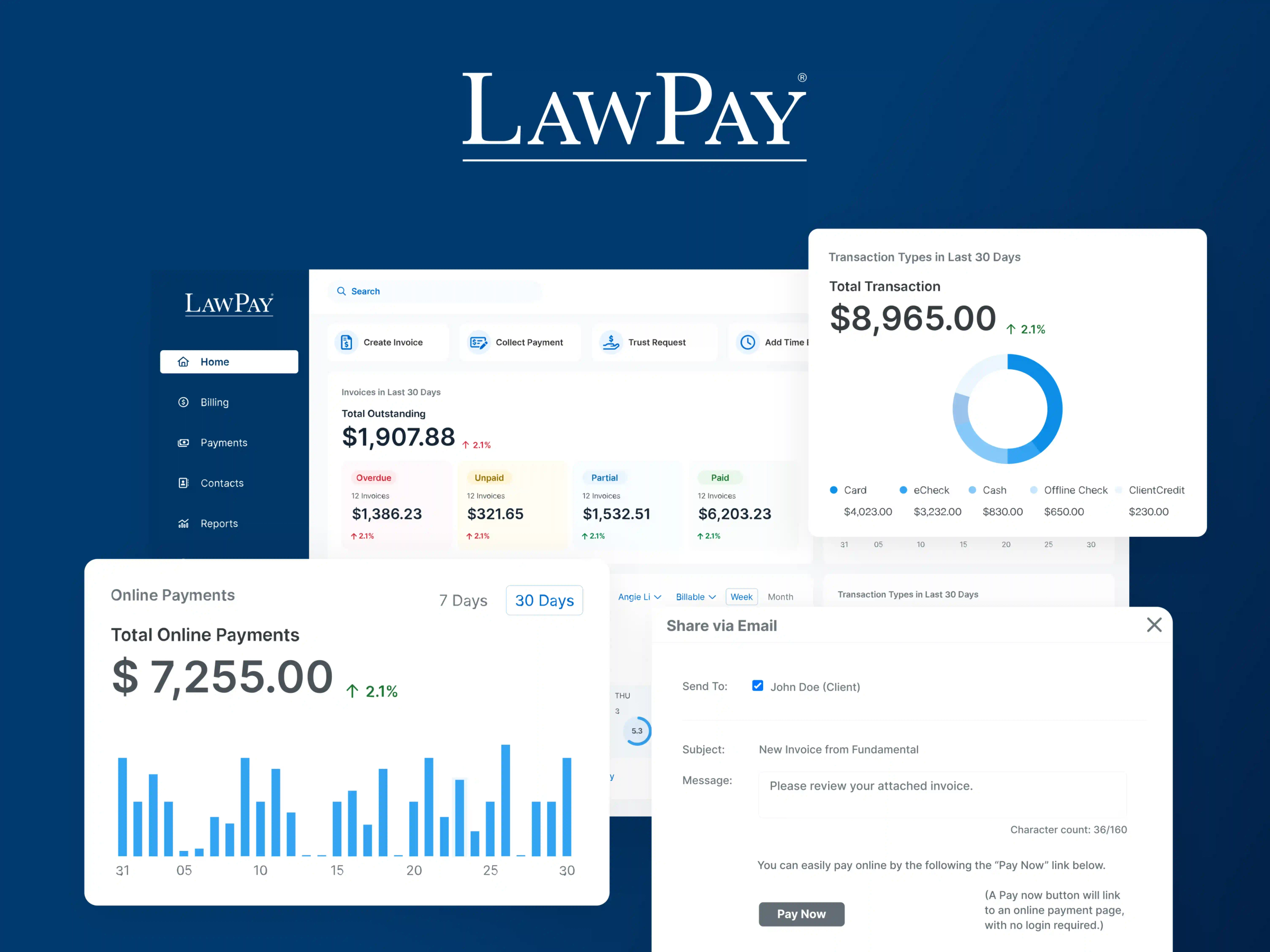Key takeaways
Chargebacks often pop up because of unclear billing, disputed fees, or fraud.
Your firm can get ahead of them by setting clear billing expectations, maintaining proof of work, and adopting fraud prevention solutions.
To make the process smoother, you can also minimize chargebacks by choosing secure payment processors with built-in chargeback support and reviewing disputes promptly with proper documentation.
Credit and debit card payments have become the norm across the legal industry. In fact, according to the 2025 Legal Industry Report, 82% of firms now accept cards through online payment processing software, and 59% say it has improved their collection rates. But with this convenience comes a big challenge: chargebacks.
A credit card chargeback occurs when a client disputes a payment, and the issuing bank reverses the transaction. While sometimes valid, chargebacks can also result from billing confusion, poor communication, or even fraudulent claims. For law firms, chargebacks can trigger compliance challenges and operational slowdowns.
A chargeback prevention strategy is key to improving the client experience and minimizing administrative tasks. For example, 35% of firms using online payment processing software report saving up to five hours a month.
In this guide, we’ll explore the most effective ways your law firm can reduce chargebacks, support compliance, and maintain client trust at every step.
What is a credit card chargeback?
A credit card chargeback happens when a client disputes a payment and asks their bank to reverse it. This can come up if an invoice isn’t clear, a client thinks the work took too long, or they see a charge they don’t recognize. Even if your firm did the work as agreed, missing authorization or unclear billing details can still lead to a dispute.
Once a client contacts their card provider, a formal investigation starts. The card company will notify your payment processor, and your firm’s account may be debited.
If your firm accepts online payments, understanding the chargeback process can help you maintain financial control and protect client relationships.
How can law firms prevent chargebacks?
Your firm can prevent chargebacks by rolling out clear, consistent billing practices and maintaining strong documentation to support every transaction. The chargeback prevention strategies below help minimize confusion, improve client communication, and protect firms during disputes.
1. Create standardized billing, payment, and dispute process guidelines
Creating a chargeback prevention plan begins with recording billing, payment, and dispute resolution procedures. Then, your firm will deliver training to help staff follow these guidelines.
Standardization also helps maintain compliance with ABA billing and trust accounting guidelines. Your firm can regularly update its procedures to reflect rule changes over time.
During onboarding, you can also provide clients with easy-to-understand documents explaining your billing policies, payment expectations, refund terms, and how to raise concerns.
Some jurisdictions have also concluded that, for ethics reasons, you should clarify that, if a chargeback is initiated, your firm may provide limited documentation—such as the agreement and billing records—to the financial institution, in accordance with professional conduct rules and with client confidentiality in mind.” — Niki Black, Principal Legal Insight Strategist at 8am™, explains.
2. Communicate billing expectations early and often with clients
Many chargebacks start from miscommunication. A key part of any chargeback prevention strategy is to set billing expectations upfront with clients and continue those conversations during their case.
During intake, walk clients through:
How you’ll bill them
When payments are due
What forms of payment you accept
Applicable fees, such as card processing fees or credit card surcharge rules
Requests for written authorization for card payments
It’s also helpful to check in regularly, especially in longer or more complicated matters. If a client doesn’t understand a charge or has concerns about timing or scope, chatting early on can help avoid reactive chargebacks later.
3. Create detailed and consistent invoices
Chargebacks often arise when a client doesn’t recognize or understand a charge. A well-structured invoicing process helps eliminate that uncertainty. An effective legal invoice includes itemized descriptions of services, work dates, applicable fees, and payment terms.
When writing descriptions, avoid vague phrases and use straightforward
billing language. Minimal jargon helps clients connect charges to the work performed. Over time, using a repeatable format builds familiarity and reduces disputes.
4. Maintain records of completed work
Even with strong billing procedures, it’s helpful to keep documentation of all work performed. If a dispute comes up, you can use this evidence to prove the work your firm completed.
Keep organized records tied to each payment or invoice, including:
Time-tracked entries or task logs
Emails or call notes showing communication with the client
Signed engagement letters or change orders
File notes, court filings, or deliverables provided
5. Manage recurring payments
Recurring billing can simplify operations, but it also requires careful setup to prevent disputes. For starters, collect client agreement to all recurring charges in writing, with the terms clearly explained during onboarding. The agreement typically includes the frequency, amount, and duration of the payments and any conditions for cancellation.
Automated payment reminders can also minimize confusion by alerting clients before each charge is processed. These reminders reinforce transparency and give clients time to ask questions or flag concerns before a dispute escalates into a chargeback.
6. Make your firm’s payment dispute process clear
A client could start a chargeback for many different reasons, but they’re more likely to go this route if they can’t figure out how to communicate directly with you. By making your firm’s payment dispute process clear, you provide them with an alternative to seeking a chargeback through their bank.
To reduce confusion and build trust, consider including the following in your client-facing materials:
Designated contact person or email for billing concerns
Specific timeframe in which clients can expect a response
Brief explanation of how disputes will be reviewed and resolved
List of documentation that clients may be asked to provide
7. Use chargeback fraud prevention and customer authentication solutions
Not all chargebacks are rooted in client dissatisfaction. Some are due to chargeback fraud and unauthorized card use. Chargeback fraud prevention solutions can help verify identity and flag suspicious transactions before they escalate. It’s also important to store credit card information securely to avoid fraud.
To protect your firm and your clients, consider using the following safeguards:
Card Verification Value (CVV)
Visa Account Updater
32D Secure 2.0 (3DS2)
Address Verification System (AVS)
IP address monitoring
Chargeback prevention alerts
8. Choose a secure payment processor with chargeback support
The technology you use can largely impact how effectively your firm handles disputes. A secure, law firm credit card processing solution helps you manage chargebacks through built-in alerts, documentation support, and expert guidance.
Look for a provider that understands your law firm's unique billing structures and offers features for trust accounting, compliance, and client communication. 8am™ LawPay, for example, is designed specifically for legal professionals and provides support if a chargeback occurs.
9. Review data, seek feedback, and routinely adjust as needed
If your firm starts seeing more frequent chargebacks, it may be time to take a closer look at your processes. Reviewing billing data, chargeback patterns, and client feedback can help identify common threads, whether it’s a confusing invoice format, unclear payment terms, or service bottlenecks that frustrate clients.
Regular check-ins with your team can also surface internal gaps, such as inconsistent intake practices or outdated authorization forms. Use this insight to refine your chargeback prevention plan and adjust workflows where needed.

What are common reasons for chargebacks?
Credit card chargebacks happen for a variety of reasons, some legitimate, others fraudulent. Understanding both can help you pinpoint the root cause of disputes and improve your firm's chargeback prevention strategies.
Common credit card chargeback reasons include:
Services not as described: The client expected a different scope, deliverable, or outcome.
Poor service: Dissatisfaction with communication, responsiveness, or results.
Service not received: The client believes work was not completed or delivered.
Billing errors: Duplicate charges, incorrect amounts, or unclear line items.
In some cases, the dispute is not due to confusion but chargeback fraud. These claims typically fall into two categories:
Friendly fraud: A client receives the service but disputes the charge anyway, often claiming they don’t recognize the transaction.
Stolen card: The transaction was unauthorized, typically because the payment details were compromised.
Why is it important for firms to prevent chargebacks?
Firms should prevent chargebacks to mitigate time and revenue losses and the reputational hit that results from them.
Excessive chargebacks can lead to higher processing fees or cause your firm to be placed in an excessive chargeback program by your credit card network. These programs often involve added compliance requirements, mandatory reporting, and penalties that can disrupt day-to-day operations.
More importantly, repeated chargebacks may signal a deeper client experience issue. Whether it’s unclear communication or inconsistent billing practices, addressing the root causes can reduce friction and improve trust.
Focusing on reducing chargebacks is a long-term strategy for credit card chargeback prevention that reinforces transparency and reliability.
What happens when law firms receive a chargeback notice?
When your law firm receives a chargeback notice, a client or cardholder has formally disputed a payment with their credit card issuer. The issuing bank starts an investigation, and the disputed funds may be withdrawn from the firm’s account during review.
Here’s how the typical chargeback process unfolds:
The cardholder disputes the charge with their bank or credit card company.
The issuing bank reviews the claim to determine if it qualifies for a chargeback under network rules.
If approved, the bank reverses the transaction, pulling funds from the firm’s account and crediting the client.
The firm receives a chargeback notice from its payment processor, outlining the reason and next steps.
The firm receives a deadline to respond with supporting documentation if it wishes to contest the chargeback.
The bank evaluates the firm’s response and decides whether to uphold or reverse the chargeback.

How can law firms respond to chargebacks?
Once your firm receives a chargeback notice, the response window starts. Taking timely, well-documented action during this time could help you reverse chargebacks and safeguard your firm’s finances.
Here are the key steps to respond effectively:
Review the chargeback notice promptly, noting the reason for the dispute and the credit card chargeback time limit for your response.
Check the card network’s specific rules and your payment processor’s documentation requirements.
Gather and submit relevant evidence, such as signed engagement letters, time logs, invoices, written authorizations, or email correspondence.
Include a clear rebuttal letter explaining why the charge was valid and referencing the documents submitted.
Track the resolution timeline, and document any further communication with your processor or client.
What’s the difference between a chargeback and a refund?
The key difference between a chargeback and a refund is who initiates the process and how it’s resolved.
Refunds are typically the result of a mutual agreement between your firm and a client, like as a goodwill gesture or compensation for a canceled service. They allow the firm to maintain control over the timeline, communication, and client relationship. When handled promptly, refunds can often prevent disputes from escalating.
Chargebacks, on the other hand, bypass the firm entirely. A client contacts their card provider, then the bank steps in, pulls the funds from the firm’s account, and starts a formal dispute process. The firm may not even be aware of the issue until the funds are already reversed.
How do chargebacks differ between credit cards and debit cards?
The process for credit card chargebacks and debit card chargebacks is similar, but the outcomes and protections can vary significantly. In general, credit cards offer broader consumer protection, while debit cards tie disputes directly to the client’s bank account, which can limit their options.
For law firms, online payment chargebacks involving credit cards are more common. These chargebacks typically allow for more time to respond and provide evidence, and card issuers tend to follow standardized rules under networks like Visa and Mastercard.
With debit card chargebacks, however, the timelines can be shorter, and the banks may apply different policies based on the nature of the dispute and the client’s account type. Understanding these differences between lawyer payment methods can help your team tailor documentation and response strategies accordingly.

Help prevent chargebacks with LawPay
Chargebacks create extra work, put client relationships at risk, and can even trigger additional scrutiny from your payment processor. Using the right technology for chargeback fraud prevention can help minimize these issues.
LawPay is built with chargeback prevention in mind. From clear transaction records to built-in fraud detection and dispute support, our platform gives your firm the solutions to reduce chargebacks and respond effectively when they happen.
To learn more about how we help firms confidently accept secure online payments, sign up for LawPay today.
Schedule a demo to see what LawPay can offer your firm.
Get a demo
FAQ about credit card chargebacks
About the author

Trent FowlerContributing author
Trent Fowler is a former engineer with more than 15 years of experience writing in data science, machine learning, finance, cryptocurrencies, law, and a dozen other fields. He was the senior technical writer at one of the largest generative AI companies in the world and the director of communications at a major blockchain analytics firm.
